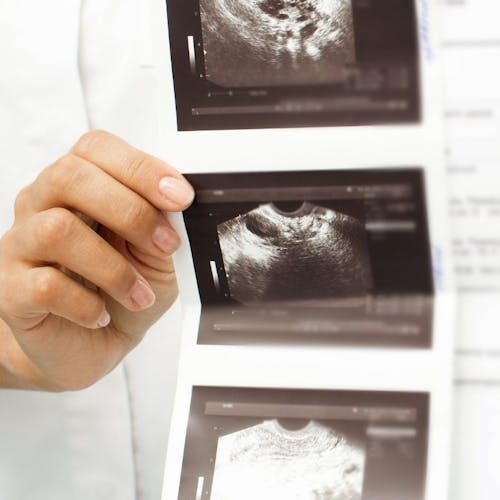This website uses cookies to enhance the user experience. By using Yoppie you are agreeing to our use of cookies.
PCOS: All the ways it affects your entire menstrual cycle
Written by Yoppie
10 May 2022
What is PCOS?
How does it affect the menstruation phase?
How does it affect the follicular phase?
How does it affect the ovulation phase?
How does it affect the luteal phase?
Why does it affect my whole cycle?
PCOS: All the ways it affects your entire menstrual cycle
At Yoppie we like to think about the whooole menstrual cycle, not just the period. Sure, the bleed days are important - and a great indicator of menstrual health - but there’s so much more we can learn from the other stages in our cycle, so we’re exploring it all here on the blog. This time, the spotlight’s on PCOS - let’s take a look at how it affects your body at every stage of your cycle, and why this is important throughout the month.
What is PCOS?
PCOS (polycystic ovary syndrome) is a common condition affecting hormone levels in people with periods. Those with PCOS produce higher levels of androgen hormones, which can cause all sorts of symptoms like irregular periods, fertility issues, hair growth on the face and body (known as hirsutism), hair loss on the head, and skin issues such as acne. Due to its association with insulin resistance, it also has ties to type 2 diabetes.
The main issues found in people with PCOS are irregular periods due to a lack of ovulation, and polycystic ovaries, meaning ovaries that become enlarged and contain fluid-filled sacs known as follicles. This explains the name polycystic ovaries, although ironically these aren’t actually cysts.
How does it affect the menstruation phase?
One of the main symptoms of PCOS is irregular periods or missed periods so, for some, it can feel like you don’t have a regular menstruation phase (bleed) every month. For those who do, they may experience very light periods or much heavier bleeding depending on a number of factors.
Heavy bleeding is often caused by lower levels of the hormone progesterone which is associated with PCOS. You’ll know if you have heavy bleeding if your periods last for 7 days or more and you lose more blood than the average person - more than 80ml would be considered heavy. You can still have regular periods with PCOS, but the more common symptom is very light periods, irregular ones, or no periods at all.
How does it affect the follicular phase?
Nothing of note happens in the follicular phase when you have PCOS, but if you get irregular periods then you may still experience a period or spotting throughout all phases of your cycle. There has been some research into whether or not a prolonged follicular phase affects the outcome of people with PCOS-related fertility issues going through ovulation induction (OI) or intrauterine insemination (IUI) and although no negative impacts were found, more research is needed to find out exactly how PCOS affects this phase.
How does it affect the ovulation phase?
PCOS does affect the fertility of some (but not all) people with the condition, which can make it difficult to get pregnant. In people with PCOS, ovaries may become enlarged and contain follicles that surround the eggs, which can lead to the ovaries failing to function regularly.
Since ovulation happens when an egg is released from the ovary, sometimes this may not happen on cue because either the ovaries are affected directly by the follicles or there are not enough of the necessary hormones to ovulate. This failure to ovulate can result in more follicles developing, causing higher levels of androgens and further symptoms.
When it comes to fertility, having PCOS may cause a lack of ovulation but that doesn’t mean you can’t get pregnant. Fertility issues in people with PCOS are thankfully very treatable and your doctor can discuss options that can increase your chances of conceiving.
How does it affect the luteal phase?
Again, PCOS tends to disrupt mostly the menstruation and ovulation phases of your cycle, but as we now know, symptoms can show up throughout the cycle so it’s possible for you to experience irregular periods or other symptoms during the luteal phase too.
Studies suggest insulin resistance (very common in people with PCOS) may be the reason for low levels of the hormone progesterone during the luteal phase, which can also lead to symptoms. However, there are treatment options that can help balance this, such as metformin - you can read our blog on how metformin is used to treat PCOS, here.
Why does it affect my whole cycle?
Since PCOS is a hormonal issue and hormones continue to fluctuate throughout the month, symptoms can (and often do) occur throughout the month too. Irregular periods are common with PCOS, but if this is something you experience do keep in mind that you don’t always have to put up with it - you can speak to your GP.
If your symptoms or fertility issues are becoming frustrating, your doctor can advise on treatment options that can improve your symptoms and quality of life. Remember, PCOS is a very common and treatable condition so there’s no harm in reaching out to see if there are any options that might help.
Fancy finding out what phase of your cycle you’re currently in? Our website has a short Learn Your Phase questionnaire to help you learn more about your cycle. We love to help people tackle the symptoms associated with the entire cycle - not just the bleed days - so whatever your symptoms or cycle goals are, we’ve got you.
Do you have a question about PCOS? You can ask over in our Full Stop FB group, or get in touch directly on IG at @itsyoppie - our team is always keen to find you the right answer. Don't forget that our personalised menstrual cycle subscription box can get organic tampons, PCOS Supplements, and much more delivered easily and regularly through your letterbox, to give you just a bit more peace of mind each cycle.
Section jump
Back to top
Subscribe To Our Newsletter
YOPPIE





© 2026 Yoppie is a registered trademark of Phlo Technologies Ltd.
Yoppie's supplements are not a substitute for a varied diet and healthy lifestyle and are not intended to diagnose, treat, or cure any disease. If you are pregnant, breastfeeding, have a medical condition or are under medical supervision, please consult with your doctor before taking any of our products.







